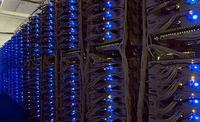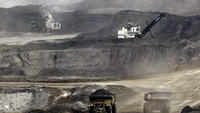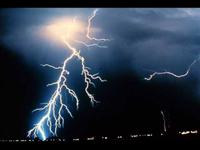-
Per capita CO2 emissions in China reach EU levels
Global emissions of carbon dioxide (CO2) increased by 3 percent last year; an estimated cumulative global total of 420 billion tons of CO2 has been emitted between 2000 and 2011 due to human activities, including deforestation; scientists suggest that in order to limit the rise in average global temperature to 2°C above pre-industrial levels, cumulative CO2 emissions in the period 2000–50 cannot do not exceed 1,000 to 1,500 billion tons
-
-
New method for detecting, measuring bridge damage
Researchers have created a bridge health index, which is a rating system that more accurately describes the amount of damage in a bridge; the health index can extend beyond bridges and apply to other structures, such as gas pipelines, dams, buildings, and airplanes
-
-
Cutting massive power use at big data companies in a flash

Big data needs big power; the server farms that undergird the Internet run on a vast tide of electricity — Google, for example, uses enough electricity in its data centers to power about 200,000 homes; now, a team of engineers has a solution that could radically cut that power use — a new type of memory in companies’ servers that demands far less energy than the current systems
-
-
Calculating the global health consequences of the Fukushima nuclear disaster

Radiation from Japan’s Fukushima Daiichi nuclear disaster may eventually cause approximately 130 deaths and 180 cases of cancer, mostly in Japan; researchers have calculated; the estimates have large uncertainty ranges, but contrast with previous claims that the radioactive release would likely cause no severe health effects
-
-
High temperature superconducting cables for electricity grids
Power grids around the world are reaching their limits at the same time that electricity demand is growing. European researchers developed and tested one of the first superconductor-based cables to address the issue; high temperature superconducting (HTS) cables have gained attention in the last couple years as a solution to the shortage of transmission capabilities
-
-
Kratos receives $10 million contract to secure petrochemical site
San Diego-based Kratos Defense & Security Solutions said it has recently received a multi-million dollar contract award to deploy a specialized security system at a petrochemical-related critical infrastructure location
-
-
Emissions from oil sands-derived fuels too varied for uniform low-carbon standards

Policy makers need to be cautious in setting new low-carbon standards for greenhouse gas emissions for oil sands-derived fuels as well as fuels from conventional crude oils; researchers found that lifecycle greenhouse gas (GHG) emissions vary widely across both actual surface mining and in situ oil sands operations and conventional crude cases reported in the scientific literature, depending on individual project operating conditions, technology used, and other factors
-
-
Small, local energy technologies to help sustain vital services during blackouts
Researchers suggest that rethinking the solution to sustaining electric power — namely, starting small — could keep critical services going, even when the high-voltage grid is crippled; the U.S. military is already taking steps to protect its power supplies in the event of a massive grid failure by adopting small, local energy technologies, and California governor Jerry Brown recently announced that he wants 12,000 megawatts of such power supplies in his state
-
-
Explaining 2011 extreme weather events

2011 will be remembered as a year of extreme weather events, both in the United States and around the world; NOAA says that every weather event that happens now takes place in the context of a changing global environment; a comprehensive annual report – State of the Climate in 2011 — provides scientists and citizens with an analysis of what has happened so organizations and individuals can prepare for what is to come
-
-
Changing climate to lead to fewer, but more violent, thunderstorms

Researcher predict that for every one degree Celsius of warming, there will be approximately a 10 percent increase in lightning activity; this could have negative consequences in the form of flash floods, wild fires, or damage to power lines and other infrastructure
-
-
Natural gas is good for the economy, environment
No matter how we drill it, using natural gas as an energy source is a smart move in the battle against global climate change and a good transition step on the road toward low-carbon energy from wind, solar, and nuclear power
-
-
A 10-year plan for Europe’s grid
A new study shows that 104 billion euro over ten years need to be invested in the refurbishment or construction of roughly 52,000 km of extra high voltage power lines and cables across Europe in order to add 3 percent generation capacity and the reliable integration of 125 GW of renewable energy sources
-
-
Students and scientists gather in Singapore to discuss water problem
International university students and water experts have converged at Singapore’s Nanyang Technological University (NTU) to foster an intellectual and research community on a scarce natural resource — water
-
-
Just-the-facts climate change Web site wins World Bank award
The World Bank award a prize to a Web site built to be the antidote to the many myths circulating online about climate change, myths which cause misplaced apathy or alarm; the site also reveals how responding to climate change presents a world of opportunities for individuals and entrepreneurs
-
-
Fukushima disaster “a profoundly man-made disaster”: investigative commission
The commission investigating the Fukushima disaster of March 2011 concluded that although the combination of the tsunami and earthquake was unprecedented in its ferocity, the disaster was largely man-made because it was amplified by what came before it and what followed it; the disaster itself, the commission said, was sandwiched by practices and conduct which were the result of government-industry collusion and the worst conformist conventions of Japanese culture; the government, nuclear regulators, and Tepco, the plant operator, “betrayed the nation’s right to safety from nuclear accidents”
-
- All
- Regional
- Water
- Biometrics
- Borders/Immig
- Business
- Cybersecurity
- Detection
- Disasters
- Government
- Infrastructure
- International
- Public health
- Public Safety
- Communication interoperabillity
- Emergency services
- Emergency medical services
- Fire
- First response
- IEDs
- Law Enforcement
- Law Enforcement Technology
- Military technology
- Nonlethal weapons
- Nuclear weapons
- Personal protection equipment
- Police
- Notification /alert systems
- Situational awareness
- Weapons systems
- Sci-Tech
- Sector Reports
- Surveillance
- Transportation
Advertising & Marketing: advertise@newswirepubs.com
Editorial: editor@newswirepubs.com
General: info@newswirepubs.com
2010-2011 © News Wire Publications, LLC News Wire Publications, LLC
220 Old Country Road | Suite 200 | Mineola | New York | 11501
Permissions and Policies
Editorial: editor@newswirepubs.com
General: info@newswirepubs.com
2010-2011 © News Wire Publications, LLC News Wire Publications, LLC
220 Old Country Road | Suite 200 | Mineola | New York | 11501
Permissions and Policies
